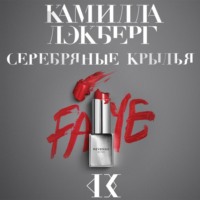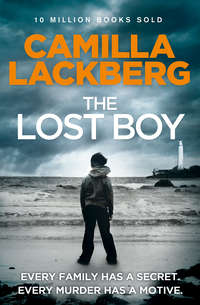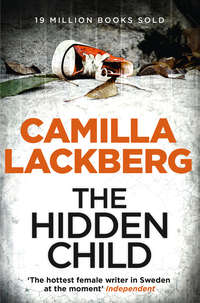
Полная версия
The Girl in the Woods
Elin gave Helga a grateful look and quickly moved off with Märta before the confrontation turned into an even bigger spectacle. People had turned to stare at her, and she knew that many thought Ebba’s accusations were justified. But Helga had always been a kind and fair woman. She was the one, after all, who had helped bring Märta into the world on that spring morning eight years ago. The birth of every child in the area had been overseen by Helga, who was skilled at midwifery. It was also rumoured that she secretly helped poor girls who had landed in trouble, but that was not something Elin fully believed.
With heavy steps she headed back towards the vicarage. The bliss she had felt after the church service was gone, and the memories of that unhappy day made her drag her feet on the short walk home. Usually she tried not to dwell on the past. Even God could not undo what was done. And to some extent Per had only himself to blame. His pride had caused him to fall. It was something she had warned him against ever since she agreed to marry him, but he had refused to listen. And now he and the others lay at the bottom of the sea as prey for the fish, while she and her daughter trudged along as lowly servants, heading for her sister’s home. She would spend the rest of her life knowing that she had sent off her husband with harsh words the last time she saw him. Words that Ebba, and God knew how many others from Fjällbacka, now held against her.
It all began with a cask of salt. Word had come that henceforth all trade with foreign lands must be conducted via Gothenburg, and Bohuslän had been forbidden to carry on trade with Norway or any of the other countries with which they had successfully conducted business in the past. This had further increased the poverty of the region, and a great animosity arose against the powers that had so blithely arrived at this decision. Not everyone abided by the rules, and coastal patrols were kept busy confiscating goods that had not been properly cleared by customs. Elin had many times urged Per to obey the regulations; not doing so would only bring misfortune upon their heads. And Per had nodded, assuring her that he agreed.
So when the customs official Henrik Meyer knocked on the door one afternoon in early September, she was not concerned as she let him enter their home. But one look at Per sitting at the kitchen table made her realize she had made a grave mistake. It took Meyer only a few minutes to find the illegal cask of salt in the back of the tool cupboard. Elin understood at once what this meant, causing her to clench her fists in the pockets of her tunic. She had warned Per so many times not to do anything foolish. Yet he could not resist.
She knew him so well. He had that unabashed look of pride in his eyes that shone through the poverty and lent him a tenacious strength. The mere fact that he had courted her testified to the courage he possessed, which most others certainly lacked. He had not known that her father cared little about her fate. In Per’s eyes, she was the daughter of a wealthy man and should have been beyond his reach. But that same audacity, that same pride and strength, had now brought them to ruin.
When the customs official entered their small home, he announced that in three days he would return to confiscate the boat Per had spent so many years toiling to make his own, even though the fishing was meagre and starvation was a constant threat. The boat was his, yet he had risked everything for the sake of a cask of salt, which he had illegally purchased in Norway.
Elin was furious. Angrier than she had ever been before. She wanted to hit him, scratch out his green eyes and tear out his blond hair. His cursed pride was about to rob them of everything. How would they support themselves now? She always took whatever work she could find, but she was unable to bring in many riksdaler, and it would not be easy for Per to get hired as crew on someone else’s boat now they were forbidden from trading with foreign goods. And the fishing was no longer profitable.
Per had reached out to put his hand on her shoulder, but she had shrugged it off and turned her back to him. Then she had wept bitter tears. From anger and from fear. Outside their small home the wind was blowing harder, and when Per got out of bed at dawn, she sat up and asked where he was going.
‘We are going out in the boat,’ he replied, pulling on his trousers and shirt.
Elin had merely glared at him as Märta slept soundly on the bench in the kitchen.
‘In this weather? Are you out of your mind?’
‘If they are going to take away my boat in three days’ time, we need to do all we can before then,’ he said, putting on his coat.
Elin hurriedly dressed and followed him out of the house. He did not stop long enough to eat anything. He seemed in such a hurry to go out into the stormy weather, it was as if the devil were on his heels.
‘You must not go out today!’ she shouted, trying to be heard over the roar of the wind. As she pursued him down the street, curious neighbours emerged to watch. Ebba of Mörhult’s husband Claes came out too, with an equally furious wife running after him.
‘You will bring death upon yourselves if you go out in this weather!’ screamed Ebba shrilly as she tugged at Claes’s jacket.
He pulled free and snarled at her: ‘We have no choice if you want the children to have food to eat.’
Per nodded to Claes, and the two of them headed for the spot where the boat was moored. Elin watched his broad back retreating, and fear sunk its claws into her so fiercely that she could hardly breathe. At the top of her lungs she yelled:
‘Have it your way then, Per Bryngelsson. Let the sea take you and your cursed boat, because I do not want you any more.’
She noticed Ebba’s frightened expression as she turned away. With her skirts flapping around her legs, Elin rushed back inside. As she threw herself on to the bed to weep, she had no idea how those words would continue to haunt her, even into death.
Chapter Eight

Jessie turned over in bed. Her mother had left for the film shoot before six a.m., and Jessie was enjoying having the house to herself. She stretched out her arms, then sucked in her stomach. It felt wonderfully smooth. Not at all fat and doughy the way it normally did. It was flat and smooth, like Vendela’s.
But eventually she had to exhale, making her stomach bulge out. She removed her hand in disgust. She hated her stomach. She hated her whole body and everything else in her life. The only thing she didn’t hate was Sam. She could still taste his kiss on her lips.
Jessie sat up and swung her legs over the side of the bed. She could hear the water lapping below the house. She pushed aside the curtains. Brilliant sunshine again. She hoped Sam would want to go out in the boat today too, in spite of the video he’d shown her.
She’d known kids like Nils, Basse and Vendela all her life, at various schools, in different countries in different parts of the world. She knew what they wanted. And what they were capable of doing.
Yet for some reason they didn’t seem interested in doing anything to her.
Jessie had always known the moment when news about her mother began to spread through a new school. First the smiles, the pride at having the daughter of a film star at their school. But that changed as soon as somebody googled her mother’s name and found out who she was: the murderer who became an actress. Then came the stares. And the whispering. She would never be one of the popular girls – because of the way she looked and because of who she was.
Her mother didn’t understand. For her, attention was always a good thing. No matter how bad the situation was for Jessie at school, she had to hang on in there until her mother started making a new film somewhere else.
It was the same for Sam. What had happened to their mothers thirty years ago hovered like a dark cloud over both of them.
Jessie went to the kitchen and opened the fridge. As usual, there was no food, just bottles of champagne. Eating was never a priority for her mother. She was too concerned about keeping her slim figure to take any interest in food. Jessie survived on the generous monthly allowance her mother gave her, spending most of the money on fast food and sweets.
She ran her hand over the bottles, feeling the cold glass under her fingertips. She took one out of the fridge – it was surprising how heavy it was – and set it on the marble countertop. She had never tasted champagne, but her mother – Marie – drank it all the time.
She tore off the metal wrapper and for several seconds stared at the wire surrounding the cork before she cautiously took it off. She pulled at the cork but didn’t hear the familiar ‘pop’. It seemed to be firmly wedged in the top of the bottle. Jessie glanced around before recalling the way Marie always wrapped a dishtowel around the cork in order to pull it out. Jessie reached for one of the white kitchen towels, then twisted the cork at the same time as she pulled on it. Finally it began to come loose. Another tug and Jessie heard the ‘pop’ as the cork flew out of the bottle.
Foam gushed out, and Jessie hurriedly stepped back to avoid being drenched with champagne. Quickly she poured some of the bubbly into a water glass she found on the counter. Hesitantly she took a sip and then grimaced. It tasted awful. But Marie usually added juice, which probably made it taste better, and she always used proper champagne glasses. Jessie took a tall, slender glass from the cupboard and then found the only container of juice in the fridge. She had no idea how much juice to use, but she filled the glass two-thirds full with champagne before adding peach juice. The concoction threatened to overflow, so Jessie slurped it up. Now it tasted much better. It was actually good.
Jessie put the open bottle back in the fridge along with the juice and then took her glass out to the dock in front of the house. Her mother was going to be away filming all day, so she could do whatever she liked.
She reached for her mobile. Maybe Sam would come over and have some champagne.
‘Knock, knock?’ Erica called through the open door, which was framed by an enormous trellis of pink climbing roses. They smelled marvellous, and she’d spent a few minutes admiring them.
‘Come in!’ said a cheerful voice from somewhere inside, so Erica took off her shoes in the hall and went in.
‘Oh my, is that really you?’ said a woman in her sixties when she saw Erica. She was holding a dishtowel in one hand and a plate in the other.
Erica always felt strange when people recognized her even though they’d never met. The success of her books had made her somewhat of a celebrity, and occasionally she was even stopped on the street by someone wanting to take her picture or ask for an autograph.
‘Hi. Yes, I’m Erica Falck,’ she said, shaking hands with the woman.
‘Viola,’ said the woman, giving her a big smile.
She had a delicate network of laughter lines at her eyes, revealing that she smiled often.
‘Do you have a few minutes?’ asked Erica. ‘I’m working on a book about one of your father’s old cases, and since he’s no longer with us—’
‘You thought you’d find out what I know,’ Viola interjected, smiling again. ‘Come in. I was just making a fresh pot of coffee. And I think I know which case you’re talking about.’
Viola led the way to the kitchen, which was off the hallway. A bright and airy room with watercolour paintings on the walls offering spots of colour. Erica paused to admire one of the paintings. She didn’t know much about art, nor was she particularly interested, but it was clear the artist was talented and she felt drawn to the image.
‘What lovely paintings,’ she said, looking at them one after the other.
‘Thank you,’ said Viola, blushing. ‘It has long been a hobby of mine, but recently I’ve started exhibiting a few of them. And it turns out people actually want to buy my work. I have a show on Friday at Stora Hotel, if you’d like to come.’
‘I may just do that. I can see why people like them. They’re wonderful,’ said Erica as she sat down at the big white kitchen table which was positioned in front of a huge mullioned window.
She loved old windows. There was something about the irregularity of the glass that made them seem much more alive than modern factory-made windows.
‘Milk?’ asked Viola, and Erica nodded.
‘Please.’
Viola brought over a sponge cake from the counter and cut two thick slices. Erica could feel her mouth watering.
‘I assume you want to talk about my father’s investigation into little Stella’s murder,’ said Viola as she sat down across from Erica.
‘Yes. I’m writing about the case, and your father Leif is an important piece of the puzzle.’
‘It’s been nearly fifteen years since Pappa died. I suppose you know that he committed suicide. It was a terrible shock, even though we should have known it might happen. He’d been terribly depressed ever since our mother passed away from lung cancer. He said he no longer had any reason to live. But I remember that up until his death he talked a lot about that particular case.’
‘Do you recall what he said?’
Erica resisted the impulse to close her eyes out of sheer pleasure as she took a big bite of sponge cake. The butter and sugar melted in her mouth.
‘It was so long ago, I can’t remember the details. Maybe they’ll come back to me if I give it some thought. But I do remember that the case bothered him. He was starting to have doubts.’
‘Doubts about what?’
‘About whether those girls really did it.’
Viola looked pensive as she took a sip of coffee from the white ceramic mug.
‘You mean he thought they were innocent?’
This was news to Erica. Her pulse quickened. After living with a police officer for many years, she knew that gut instincts often turned out to be right. If Leif had doubted the girls’ guilt, he must have had good reason.
‘Did he say why he was having doubts?’
Viola held her coffee mug in both hands, caressing the grooves on the sides with her thumbs.
‘No,’ she said, frowning. ‘He never mentioned anything specific. But I suppose it didn’t help that both girls retracted their confessions and continued to proclaim their innocence all these years.’
‘But no one believed them,’ said Erica, recalling the many articles she’d read about the case, and the response from local residents whenever the case happened to come up in conversation.
Everybody seemed to be in agreement: the girls had killed Stella.
‘Right before he died, he started talking about re-opening the case, but he killed himself before he could do anything. Besides, he was retired, so he would have had to persuade the new chief of police, who I don’t think would have been especially keen on the idea. The case was solved. The question of guilt had been established, even though there was never a proper trial because the girls were so young.’
‘I don’t know whether you’ve heard, but …’ Erica began, glancing at her mobile. Still no word from Patrik. ‘A little girl went missing yesterday afternoon, or possibly even since the night before, from the same farm where Stella lived.’
Viola stared at her.
‘What? No, I haven’t heard a thing. I’ve been in my studio, working on the paintings for my show. What happened?’
‘They don’t know yet. They’ve been out searching since yesterday afternoon. My husband is a police officer, so he’s involved in the search.’
‘Oh no. Good gracious.’
Viola was struggling to find the right words. No doubt she was experiencing the same flood of emotions that Erica had on hearing the news.
‘It’s a strange coincidence,’ said Erica. ‘Too strange. And the girl is the same age as Stella. Four years old.’
‘Oh, dear God,’ said Viola. ‘Maybe she just got lost. That farm is in a rather remote spot, isn’t it?’
‘Yes, it is. I hope that’s what happened.’
But Erica could see Viola wasn’t convinced either.
‘Did your father write down any notes on the case? Do you think he might have saved some of the investigative materials at home?’
‘Not that I’m aware of,’ replied Viola. ‘My two brothers and I took care of Pappa’s estate after he died, but I can’t recall seeing anything. I can check with my brothers, but I don’t think there were any notebooks or case files. If there were, I’m afraid we must have thrown them out. None of us are sentimental about saving things. We believe we keep our memories in here.’
She placed her hand on her heart.
Erica knew what she meant and wished she was the same way. She had a hard time getting rid of things with sentimental value, and Patrik was always joking that he was married to a hoarder.
‘Please do ask them. And here’s my phone number, in case you happen to find anything. Or if you remember something your father said about the case. Anything at all. Don’t hesitate to phone, no matter how insignificant it might seem. You never know.’
Erica took a business card from her purse and handed it to Viola, who studied it for a moment before setting it on the table.
‘Such awful news about that little girl. I hope they find her,’ she said, shaking her head.
‘I hope so too,’ replied Erica, again glancing at her mobile.
Still no message from Patrik.
‘Well, thank you,’ she said, getting up to leave. ‘I’ll try to stop by the gallery on Friday if I can. I love your paintings.’
‘I hope to see you then,’ said Viola, blushing at Erica’s praise.
As Erica headed for her car, the scent from the roses lingered in her nostrils. And Viola’s words rang in her ears.
Leif had harboured doubts that Marie and Helen were guilty.
It felt as if they’d been waiting for an eternity, but an hour after Mellberg made the call, Torbjörn Ruud and his team of technicians from Uddevalla came walking through the woods. Patrik ushered them towards the tree trunk a couple of metres inside the area he had cordoned off.
‘Oh hell,’ said Torbjörn. Patrik nodded.
He knew crime scene techs had seen just about everything, and over time they couldn’t help but become inured to the horror. But dead children never ceased to affect them. The contrast between the vitality of a young child and the utter finality of death felt like a punch in the solar plexus.
‘Is that where she is?’ asked Torbjörn.
‘Under the tree trunk,’ Patrik confirmed. ‘I haven’t gone over to check. I wanted to wait for you to get here so as to avoid having anyone else walking through the site. According to the men who found her, there’s a hollow space, and her body was shoved inside. That’s why we didn’t find her earlier, even though we searched this area several times.’
‘Are those the men who found her?’
Torbjörn pointed at Harald, Johannes and Karim, who were standing a short distance away.
‘Yes. I asked them to stay here, so you could make sure nothing at the crime scene came from them. I assume you’ll want to photograph their shoes to identify which footprints are theirs.’
‘That’s right,’ said Torbjörn. He rattled off some instructions to one of the techs he’d brought along. Then he put on a protective suit and pulled plastic coverings over his shoes. Patrik did the same.
‘Come on,’ said Torbjörn when they were both ready.
Patrik took a deep breath and followed him over to the tree. He steeled himself for what they were about to see, but the sight still upset him so much that for a moment he froze. The first thing he saw was a child’s hand. As he’d been told, the little girl’s naked body had been stuffed into a hollow in the ground underneath the tree. She was curled up as if in a foetal position. Her face was turned towards them, though partially hidden by her hand, which was black with dirt. Her blond hair was covered with dirt and leaves, and Patrik had to stop himself from bending down to brush off the debris. Who could have done such a thing? What kind of person would do that? Fury rushed through his veins, giving him the strength to do what he had to do. It helped him to remain cold and professional, putting his own feelings aside until later. He owed it to the little girl and her parents. And after many years of working together, he knew Torbjörn would be doing the same.
They squatted down next to each other and took in all the details. The child’s body was mostly hidden from view, making it impossible to tell the cause of death. That would come later. What mattered at the moment was securing any evidence the perpetrator might have left behind.
‘I’ll step away for a while and let your team get to work,’ said Patrik. ‘Let me know when we can lift her out. I want to help.’
Torbjörn nodded, and signalled for the techs to move in and begin the meticulous task of collecting evidence from the area surrounding the tree. It was a task that could not be hurried. The smallest strand of hair, a cigarette butt, a piece of plastic, everything found in the area would have to be photographed, placed in plastic bags, and labelled. Any footprints in the loose soil would have to be lifted by pouring a viscous substance into the indentation; once the substance hardened, the techs could remove the entire footprint and take it back to the lab for comparison. It was time-consuming work, and having participated in a number of homicide investigations, Patrik had learned to curb his impatience and allow Torbjörn and his team to do their job in peace. The evidence they collected would be vital when the murderer was brought to trial. If anything was lost due to carelessness, it might harm their case.
Patrik stepped beyond the cordoned-off area and took up position a short distance away. Right now he didn’t have the energy to talk to anyone. He needed to gather his thoughts and prepare for what had to be done. The first twenty-four hours of an investigation were crucial; they needed to trace witnesses before they had time to forget what they’d seen, and to ensure that evidence was gathered before it could be erased or damaged by the elements, or by the perpetrator returning to remove all traces. A lot could happen in twenty-four hours, so it was important to prioritize. In theory, Mellberg, as the station chief, should have been in charge of this, but in practice the responsibility fell on Patrik’s shoulders.
He got out his mobile to text Erica and let her know he’d be late. She’d be wondering what was going on, and he trusted her to be discreet and keep the news to herself until he gave her the all clear. But there was no reception, so he put his phone back in his pocket. He’d ring her later.
It was hot. He closed his eyes and turned his face towards the sun. The sounds from the woods blended with the murmured conversations of the techs. Patrik thought about Gösta. He wondered how he was doing, and he was grateful he wasn’t the one who had to tell Nea’s parents.
A mosquito landed on his bare arm. He opened his eyes, but resisted the impulse to kill it, swatting it away instead. There had been enough death for one day.
It was all so surreal. Here he stood in the middle of a Swedish wood with people he’d never met before.
This was not the first time Karim had seen a dead body. When he was imprisoned in Damascus, a dead man had been dragged from the cell right in front of his eyes. And during the journey across the Mediterranean Sea, he’d seen dead children floating next to the boat.
But this was different. He’d come to Sweden because it was a country with no dead children. Yet a dead girl was lying only a few metres away.
Karim felt someone touch his arm. It was the older man named Harald, the one with the kind brown eyes who spoke English with such a strong Swedish accent that Karim found it difficult to understand. But he liked the man. They had passed the time by chatting. When neither of them could find the right words, they had resorted to gesturing and miming. And the younger guy, Johannes, had helped Harald find the English words that eluded him.









